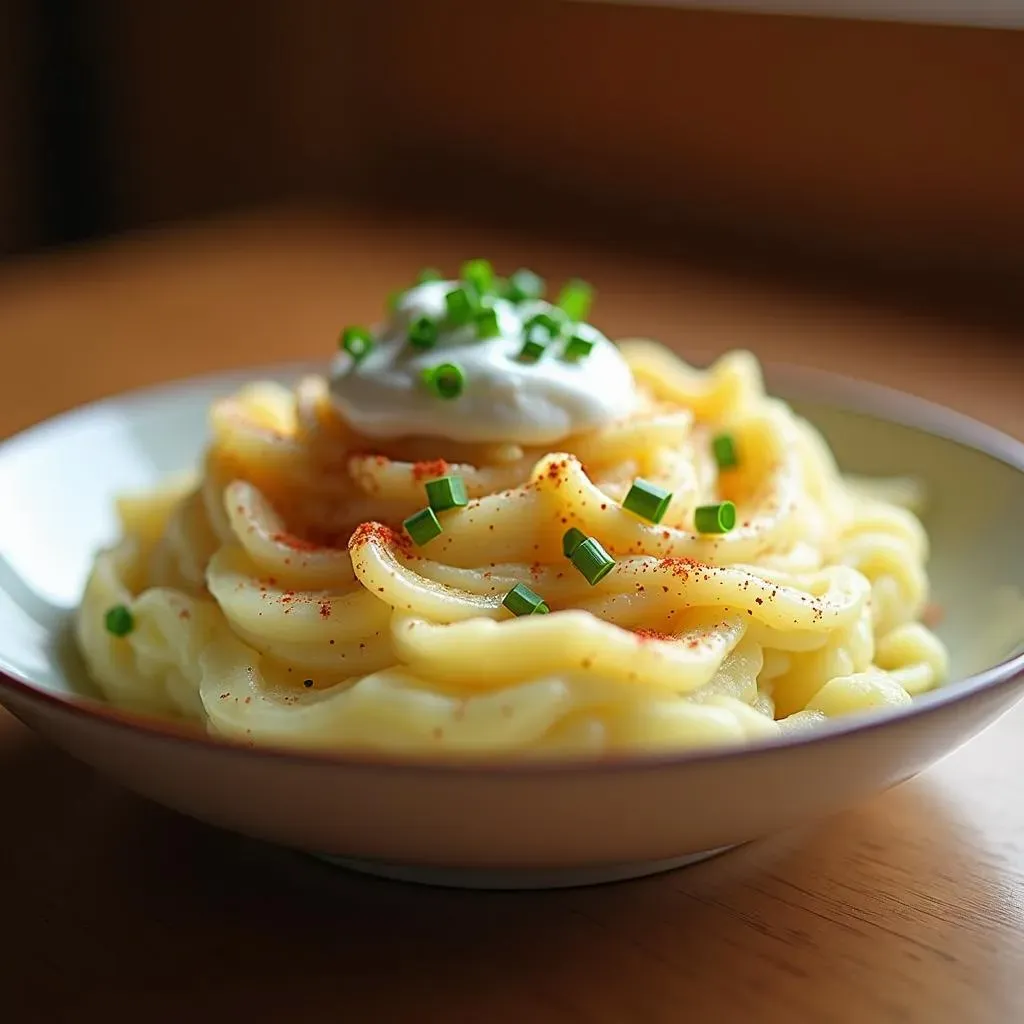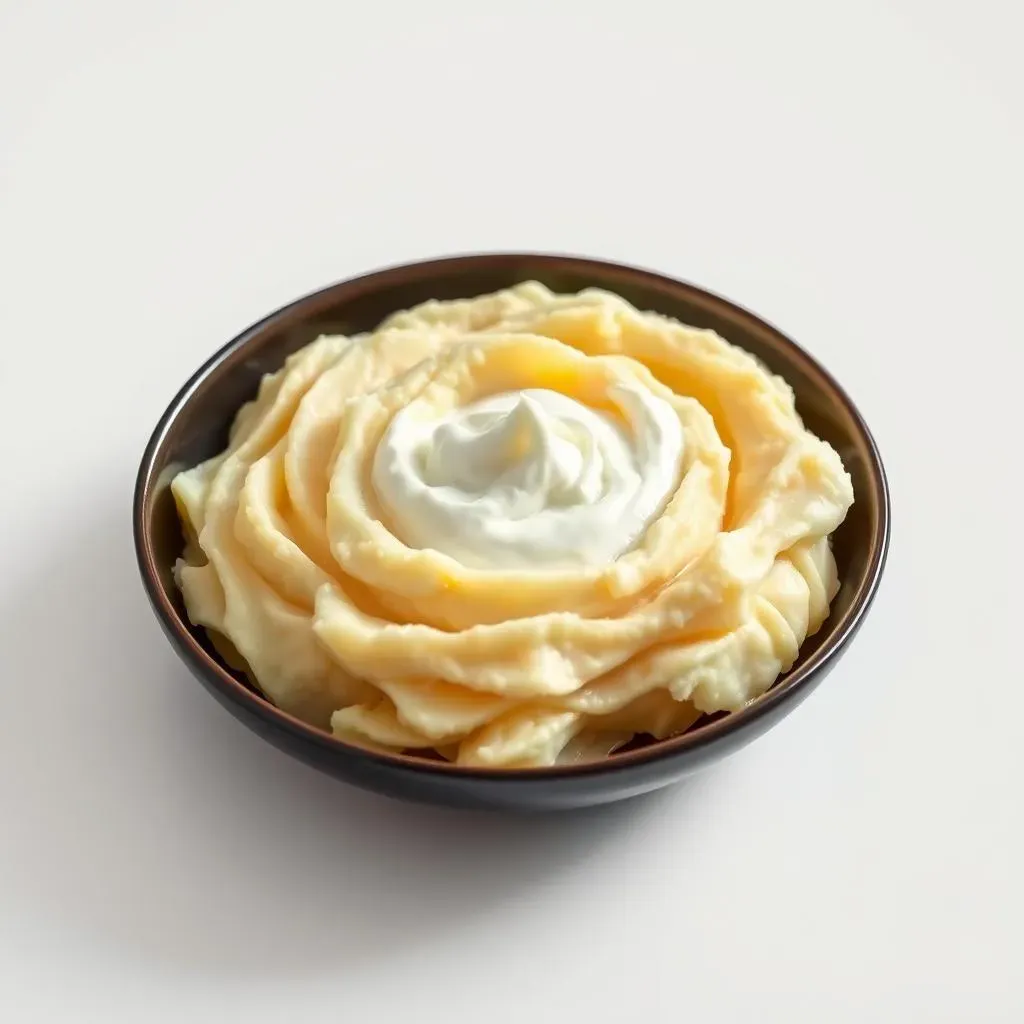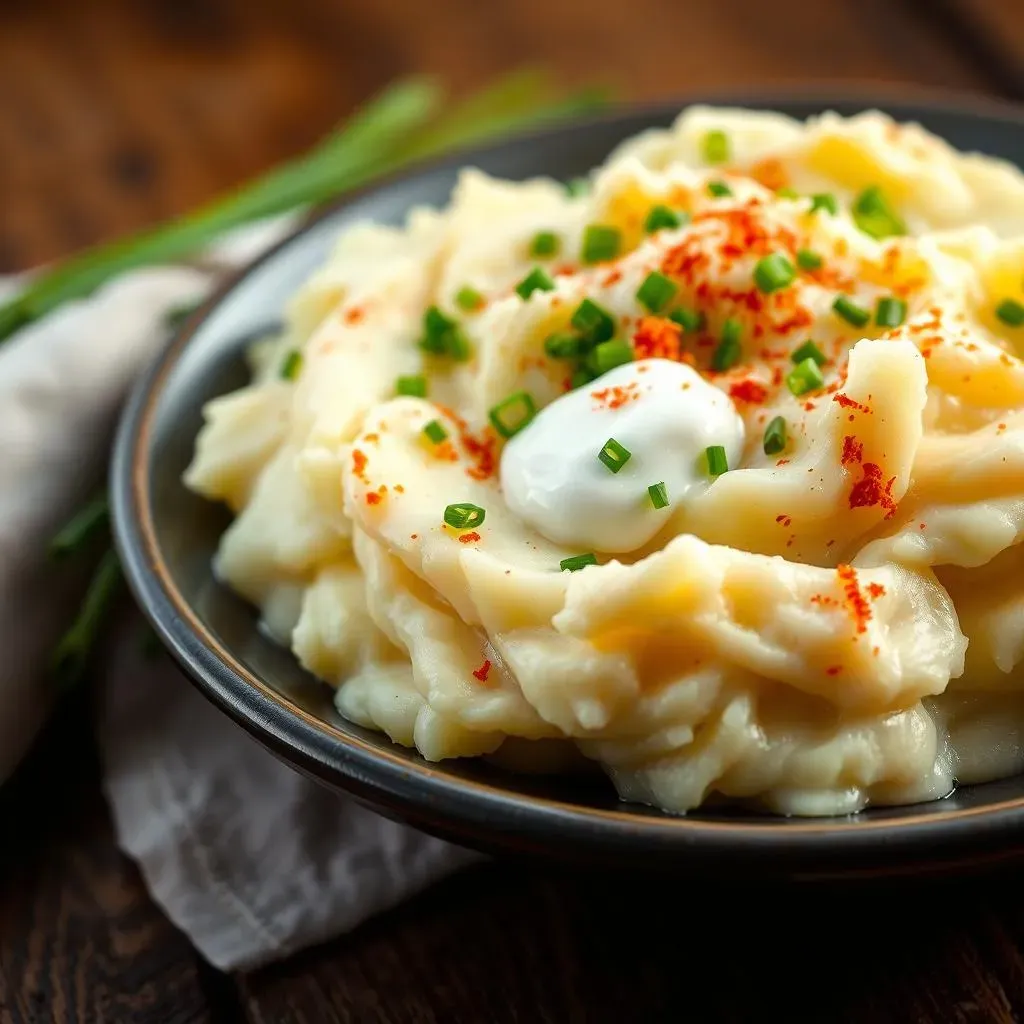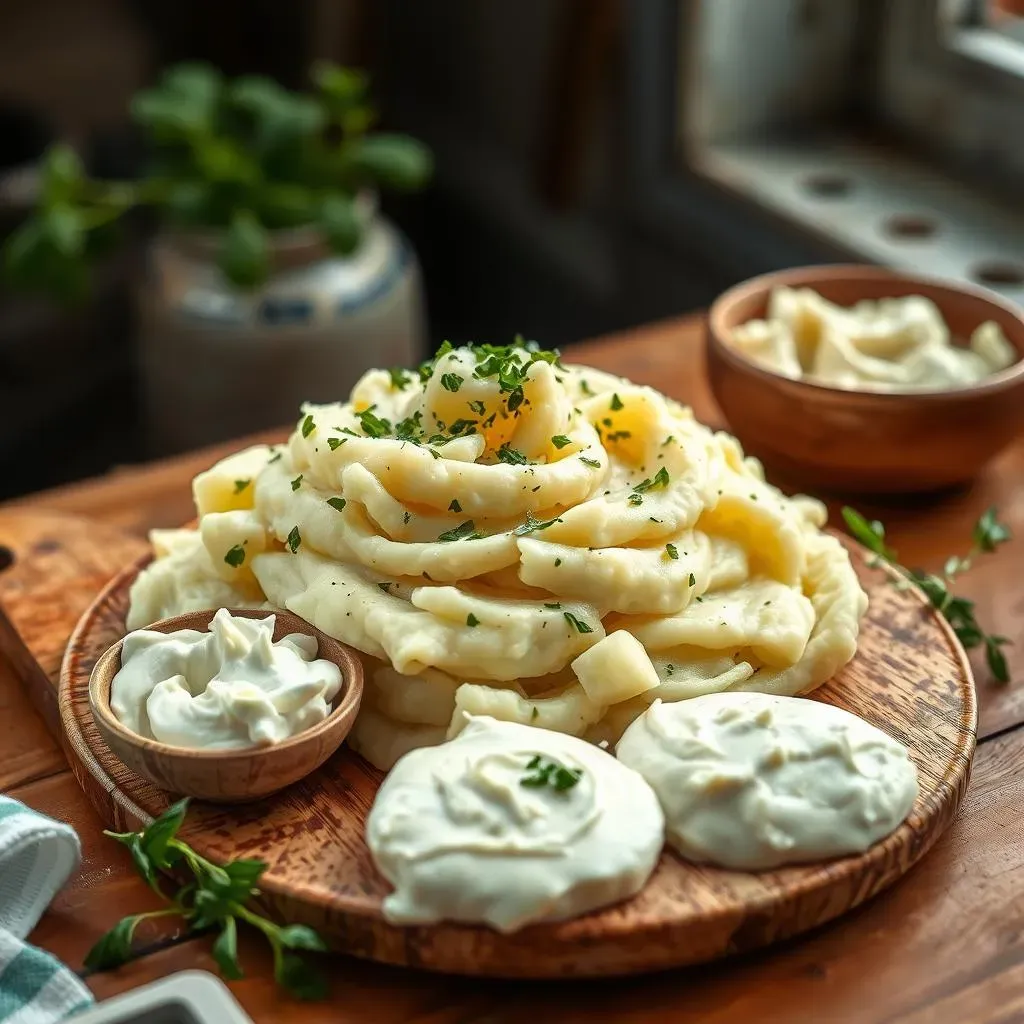Table of Contents
Ever wondered if you can swap out milk for sour cream in your mashed potatoes? We've all been there – staring into the fridge, realizing we're short on milk, but craving those fluffy, creamy spuds. This article tackles the burning question: "Can you substitute sour cream for milk in mashed potatoes?" We'll go beyond a simple yes or no, diving deep into the culinary consequences of this substitution. Get ready for a fascinating exploration of taste, texture, and the surprising ways sour cream can transform your mashed potato game. We'll analyze how sour cream affects the texture of your potatoes, creating a richer, potentially denser final product. Then, we'll explore the flavor profile changes – that tangy twist that sour cream brings to the table. Finally, if sour cream isn't your thing, we'll offer some delicious alternatives to ensure your mashed potatoes remain creamy and delectable. So, grab your potato masher and let's get started on this creamy adventure!
Can You Substitute Sour Cream for Milk in Mashed Potatoes? A Taste Test

Can You Substitute Sour Cream for Milk in Mashed Potatoes? A Taste Test
The Straightforward Swap
Let's cut to the chase: yes, you absolutely *can* substitute sour cream for milk in mashed potatoes. It's a perfectly viable swap, though it does change the final product in some key ways. Think of it less as a direct replacement and more of a creative twist. You're not just changing the liquid; you're introducing a whole new flavor profile and texture element. It's like adding a secret ingredient that elevates the ordinary mashed potato to something more exciting. The key is understanding what those changes are and whether they'll work for your taste and recipe.
Many recipes call for milk primarily for moisture and creaminess. Sour cream delivers both, but it also brings a distinct tang and a thicker consistency. So, while your potatoes will still be creamy, they'll have a richer mouthfeel and a slightly sharper edge to the overall flavor. It's a subtle but noticeable difference that can be delightful or a dealbreaker depending on your preference. This is where experimentation comes into play. Start with a small substitution, maybe half sour cream and half milk, to see how you like the balance.
Ingredient | Milk | Sour Cream |
|---|---|---|
Flavor Profile | Neutral, creamy | Tangy, creamy |
Texture | Light, fluffy | Rich, denser |
Fat Content | Varies (skim, whole, etc.) | Higher fat content |
The Unexpected Deliciousness
Now, let's talk about the unexpected deliciousness that sour cream can bring to mashed potatoes. While milk provides a neutral backdrop, sour cream adds a layer of complexity. It's that subtle tang that can cut through the richness of the butter and potatoes, preventing them from feeling too heavy. Imagine a comforting classic with a surprising, zesty kick. That's the magic of sour cream. It's a simple swap that can transform a side dish into a culinary adventure.
Consider this: sour cream can pair beautifully with herbs and spices. A dash of chives, a sprinkle of paprika, or even a little garlic powder can enhance the tangy flavor and create a symphony of textures and tastes in your mashed potatoes. The tang of the sour cream acts as a counterpoint to the earthiness of the potatoes, offering a more dynamic flavor experience than plain milk would ever allow. Don't be afraid to experiment! Try adding different herbs and spices to discover your own perfect sour cream mashed potato masterpiece.
- Chives
- Paprika
- Garlic Powder
- Fresh Parsley
- Black Pepper
Texture Transformation: How Sour Cream Changes Mashed Potatoes

Texture Transformation: How Sour Cream Changes Mashed Potatoes
The Creamy Conundrum
So, you're curious about how sour cream impacts the texture of your mashed potatoes? Let's get into the nitty-gritty. Unlike milk, which primarily adds moisture and a slight creaminess, sour cream brings a whole lot more to the party. Its higher fat content and thicker consistency mean your mashed potatoes will be noticeably denser and richer. Think less fluffy clouds and more luxurious, almost velvety swirls. It's a trade-off, of course. The increased density means you might lose a little of that airy lightness you get with milk, but you gain a depth and richness that's hard to resist.
The amount of sour cream you use significantly affects the final texture. A small amount will add creaminess without dramatically changing the consistency. However, using sour cream as your sole liquid will result in a much heavier, almost paste-like texture. It's all about finding the right balance. Consider starting with a ratio of half milk, half sour cream, and adjust from there, depending on your preferred level of creaminess and density. Don't be afraid to experiment; that's how you find your perfect mashed potato nirvana!
Sour Cream Amount | Texture Result |
|---|---|
Small amount (1/4 cup) | Slightly creamier, maintains fluffiness |
Moderate amount (1/2 cup) | Creamier, slightly denser |
Large amount (1 cup or more) | Very creamy, dense, almost paste-like |
Mastering the Mash
Another factor influencing texture is how you mash your potatoes. If you prefer ultra-smooth mashed potatoes, a ricer or food mill will work wonders, no matter what liquid you use. These tools create an exceptionally fine texture, breaking down the potato cells completely. However, if you prefer a slightly chunkier consistency, a potato masher is your best friend. It leaves some texture in your spuds, adding a nice rustic touch. Regardless of your method, remember that the hotter the potatoes, the creamier your final product will be. The heat helps the fats in the sour cream and butter emulsify smoothly with the potatoes, contributing to a smoother, more cohesive texture.
Finally, don't underestimate the power of the potato itself! Different potato varieties have varying starch contents, directly impacting texture. Russet potatoes, known for their high starch content, tend to become fluffier when mashed, whereas Yukon Gold potatoes, with lower starch, create a creamier, denser mash. Experiment with different types to discover which best suits your preferences and achieves your desired level of creaminess and density when using sour cream. The world of potatoes is vast and delicious; explore it!
- Ricer: Ultra-smooth texture
- Food Mill: Ultra-smooth texture
- Potato Masher: Chunkier texture
- Hot Potatoes: Creamier results
Flavor Fiesta: The Tangy Twist of Sour Cream Mashed Potatoes

Flavor Fiesta: The Tangy Twist of Sour Cream Mashed Potatoes
The Tangy Tango
Let's talk about the star of the show: the tang! Sour cream isn't just adding creaminess; it's injecting a delightful acidity that dances on your tongue. This tanginess isn't overpowering; it's a subtle counterpoint to the richness of the butter and the earthiness of the potatoes. It's a refreshing twist, preventing the mashed potatoes from feeling heavy or one-dimensional. Think of it as a bright, zesty melody that adds depth and complexity to the overall flavor profile. It's a flavor enhancer, not a flavor dominator.
The level of tanginess can vary depending on the brand and type of sour cream you choose. Some sour creams are more tart than others, so experimenting with different brands is a fun way to discover your perfect balance of tang and creaminess. Remember, you can always adjust the amount of sour cream to control the intensity of the tangy flavor. A little goes a long way, but don't be afraid to experiment and find your perfect sour cream sweet spot!
Sour Cream Type | Tanginess Level | Best Paired With |
|---|---|---|
Regular Sour Cream | Moderate | Butter, herbs, chives |
Full-Fat Sour Cream | Slightly less tangy, richer | Garlic, roasted vegetables |
Low-Fat Sour Cream | More tangy, less rich | Spices, pepper |
Elevating the Everyday
Beyond the inherent tang, sour cream provides a blank canvas for enhancing flavors. It's a versatile ingredient that interacts beautifully with various herbs and spices. Imagine the creamy richness of sour cream mashed potatoes infused with the bright freshness of chives, or the subtle warmth of roasted garlic. The possibilities are endless! The tang of the sour cream acts as a flavor bridge, connecting the earthiness of the potatoes with the other elements in your dish. It's not just a side dish; it's a culinary experience waiting to be crafted.
Consider adding a sprinkle of paprika for a smoky undertone, or a dash of black pepper for a spicy kick. You could even experiment with more adventurous flavor combinations, like adding a hint of curry powder or a touch of lemon zest for an unexpected burst of citrus. The beauty of sour cream mashed potatoes lies in their adaptability. They're a blank canvas, ready to be personalized to your exact taste preferences. Don't be afraid to let your creativity run wild!
- Chives and Garlic
- Paprika and Black Pepper
- Curry Powder and Lemon Zest
- Fresh Rosemary and Thyme
- Roasted Garlic and Parmesan Cheese
Sour Cream Substitutions: Alternatives for Creamy Mashed Potatoes

Sour Cream Substitutions: Alternatives for Creamy Mashed Potatoes
Dairy Delights: Exploring Creamy Alternatives
So, you're out of sour cream, but still craving those luxuriously creamy mashed potatoes? Don't despair! The culinary world offers a plethora of delicious alternatives. Let's explore some dairy-based options that can deliver similar richness and creaminess without the tang. Heavy cream is a top contender, offering a richer, denser texture than milk and a similar neutral flavor profile that won't clash with your other ingredients. A half-and-half mixture of milk and cream also works well, offering a balance of creaminess and lightness. Buttermilk, with its slightly tangy yet creamy texture, is another fantastic choice, adding a subtle depth of flavor to your mashed potatoes. Finally, crème fraîche, a cultured cream similar to sour cream but with a milder flavor, provides a luxurious creaminess without the pronounced tang.
The key to successfully substituting sour cream lies in understanding its role in the recipe. It's not just about the liquid; it's about the fat content and the resulting texture. When choosing a substitute, consider the fat content and how it will impact the final consistency of your mashed potatoes. Higher fat content means a richer, denser texture, while lower fat content results in a lighter, fluffier consistency. Experiment with different ratios and alternatives to find your perfect balance of creaminess and texture. Remember, culinary creativity is all about finding what works best for your palate!
Substitute | Fat Content | Texture | Flavor Profile |
|---|---|---|---|
Heavy Cream | High | Rich, dense | Neutral, creamy |
Half-and-Half | Medium | Creamy, light | Neutral, creamy |
Buttermilk | Medium | Creamy, slightly tangy | Tangy, creamy |
Crème Fraîche | High | Rich, creamy | Mild, creamy |
Beyond Dairy: Vegan Creaminess
For those following a vegan or dairy-free lifestyle, or simply seeking dairy-free options, there are some excellent plant-based alternatives that can achieve similar creaminess in your mashed potatoes. Cashew cream, made by blending soaked cashews with water, creates a luxuriously smooth and creamy base. Coconut milk, particularly the full-fat variety, adds a subtly sweet and creamy texture, though its distinct flavor might not be suitable for all palates. Silken tofu, surprisingly, also works well, providing a creamy texture and a mild, almost neutral flavor that blends seamlessly into the potatoes. Remember, the key here is to choose a full-fat version for optimal creaminess and richness.
When substituting with plant-based options, you might need to adjust the liquid amount slightly, as some alternatives absorb liquid differently than dairy products. Start with a smaller quantity and gradually add more until you achieve your desired consistency. Also, remember that plant-based creams often have a different flavor profile than dairy, so be mindful of how this might affect the overall taste of your mashed potatoes. Don't hesitate to experiment with seasonings and herbs to complement the unique flavors of your chosen plant-based alternative. The world of vegan cooking is vast and delicious – explore it!
- Cashew Cream: Rich, smooth, neutral
- Full-Fat Coconut Milk: Creamy, subtly sweet
- Silken Tofu: Creamy, mild
- Avocado (mashed): Creamy, slightly nutty